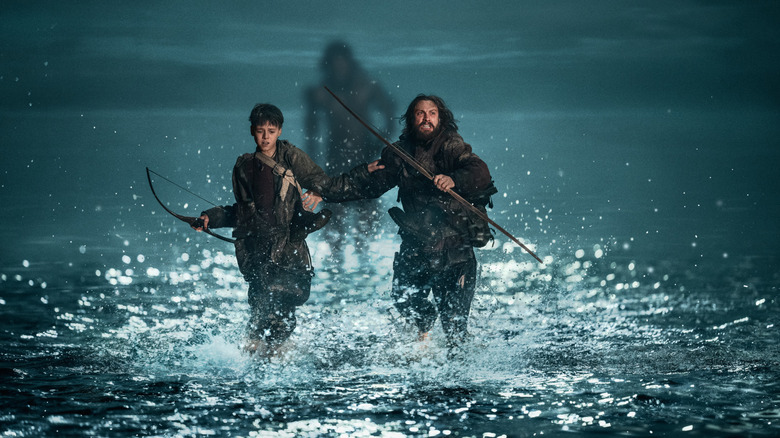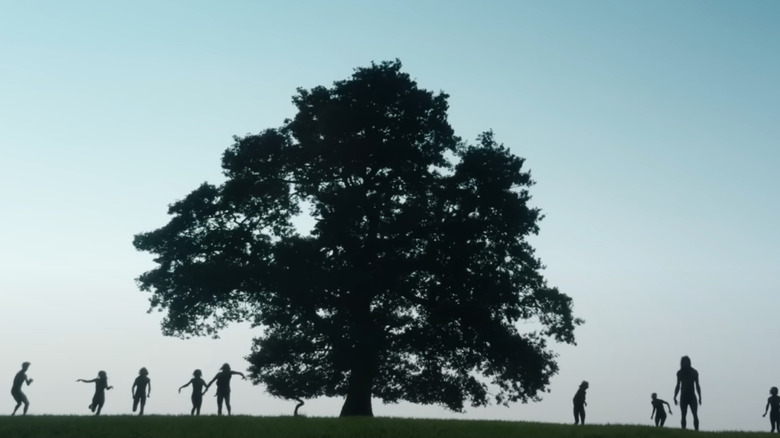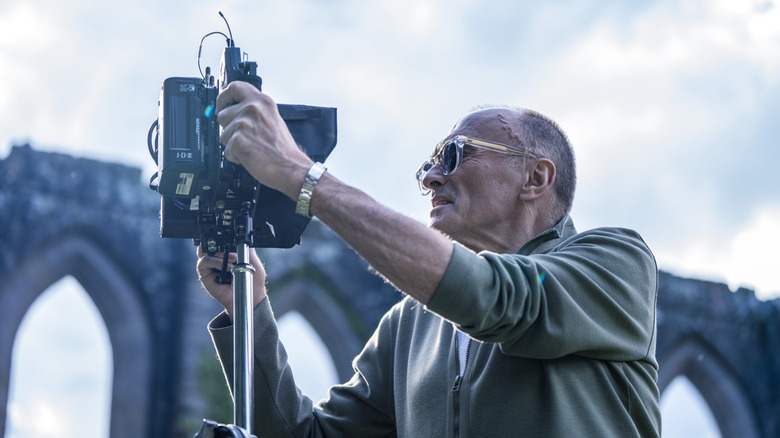The Best Part Of 28 Years Later Happened By Accident
For as much care and attention to detail that goes into any given movie, sometimes the most memorable moments are purely a product of happenstance. One of the many reasons "Jaws" works so well is because Steven Spielberg keeps the creature off-screen for as long as he does, but that was only because the darned shark animatronic named Bruce refused to cooperate throughout filming. And, as many people know, that famous "Indiana Jones shoots first" moment in "Raiders of the Lost Ark" came about after several of the cast and crew came down with dysentery and had to scrap an elaborate sword fight sequence at the last moment. While it's a bit premature to begin talking about "28 Years Later" in the same breath as those classics, well, it turns out that one key aspect of the film may very well go down as a similar instance of serendipity.
Who can forget that incredible trailer for Danny Boyle's long-awaited sequel "28 Years Later," which eschewed more traditional or modern music in favor of a the most nightmare-inducing thing possible: a haunted rendition of the Teletubbies theme song a Rudyard Kipling poem? That instantly made waves among viewers, many of whom (including me) likely assumed that this would play a fairly integral role in the actual movie itself. It certainly did, popping up as a tone-setting soundtrack to an early montage sequence as Aaron Taylor-Johnson's grizzled Jamie and his young son Spike (Alfie Williams) set out onto the mainland in search of infected to kill as a rite of passage.
But, incredibly enough, we all got the order of operations completely wrong. Rather than the marketing folks taking this poem out of the movie and adding it to the trailer footage, a trailer editing company made the shrewd call to add that in ... which led to the overwhelmingly positive reactions that Boyle took note of and, as a result, included it in the final film.
We have the 28 Years Later marketing team to thank for the Kipling poem
As the events of "28 Years Later" prove, it always pays to keep an open mind. We're certainly glad director Danny Boyle did, especially since it led to such incredible results — both in the trailer and in the movie itself. The reveal of the origins behind that Rudyard Kipling poem came courtesy of Boyle himself in an interview with Variety. From now on, simply reading the words "boots, boots, boots, boots" will likely activate memories of the zombie sequel with no other prompting. As Boyle explains, that ineffable psychological effect was precisely what they were looking for to convey Jamie and Spike's background in their sequestered island community:
"We had all these archives that we wanted to use to suggest the culture that the island was teaching its children. It was very much a regressive thing — they were looking back to a time when England was great. It's very much linked to Shakespeare. For those who know the 'Henry the Fifth' film, there's a very famous speech, the Saint Crispin's Day speech, which is about the noble, heroic English beating the French with their bows and arrows. We were searching for a song, for a hymn — for a speech, actually."
After admitting that they almost used that exact clip of the speech in "28 Years Later," Boyle revealed that the trailer footage won him and writer Alex Garland over. "And then we watched the first trailer that Sony sent us — Alex and I remember it vividly — and there was this [recording] on it, and we were like, 'F***ing hell!' It was startling in its power. The trailer is a very good trailer, but there was something more than that about that [recording], about that tune, about that poem. We tried it in our archive sequence, and it was like it was made for it." That archive sequence refers to the montage where the editing abruptly cuts from Jamie and Spike marching inland during their hunt for infected to footage of old medieval movies, war footage, and other evocative visuals — all while actor Taylor Holmes' century-old recording of Kipling's poem blares chaotically in the background.
28 Years Later is the latest instance of a director taking their cues from marketing
Credit for the Rudyard Kipling poem goes to Megan Barbour, the director of music at the marketing company Buddha Jones. According to Variety, she was "briefed" on Alex Garland's screenplay, remembered the poem from an acquaintance who underwent SERE (Survival, Evasion, Resistance, and Escape) training where the US military implements that very same recording for its mental impact, and subsequently suggested it to trailer editor Bill Neil. Of the three separate, largely dialogue-free teasers submitted by the Buddha Jones agency, Sony Pictures decided on the Kipling one ... and the rest is history. As Boyle put it, "It's like a reverse osmosis. It came into the film and seemed to make sense of so much of what we'd been trying to reach for."
Still, this is hardly the most notable instance of such a thing happening, of course. "Mission: Impossible" director Christopher McQuarrie has spoken openly about his willingness to meet with marketing teams early in production to gain insight on how they want to sell the film. Interestingly, "The Invisible Man" director Leigh Whannell once appeared on the Directors Commentary with Mike Flanagan podcast to talk about how one unforgettable shot of the main villain's visible breath appearing next to star Elisabeth Moss came directly from the marketing:
"That moment came out of a conversation with the marketing people ... before I even shot it, they wanted to sit me down, the people at Universal, and say, 'OK, so here are some things you could do that would really help us with the trailer. You don't have to do them, but here are our suggestions.' And on the list was like, 'Seeing someone's breath...'"
Let this be a lesson to young filmmakers out there: In an inherently collaborative artform, you just never know where the coolest idea in your movie may come from. Sometimes, the marketing folks can end up becoming your best friends.
"28 Years Later" is now playing in theaters.


